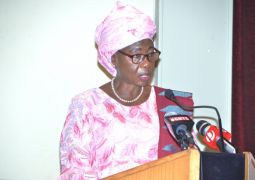
The sureties are to each swear to an affidavit of means in the above sum and also deposit their ID cards with the registrar of the court. The accused persons are to surrender their all their travelling documents to the registrar of the court pending the hearing and determination of the case. If their documents are with the investigators or DLEAG, then they must be provided to the registrar of the court.
The accused persons were charged on two counts of conspiracy, nine counts of money laundering, two counts of possession of prohibited drugs, dealing in prohibited drugs and dealing in controlled drugs.
In his ruling, the presiding magistrate said that it was his humble opinion that the legality or otherwise of all judicial proceedings are premised on jurisdiction. He stated that it is the foundation which grips the pillars of legal proceedings in court. “If it is found wanting or lacking and the court continued to proceed with a case, the whole proceedings would become nullity and of no essence,” he posited.
Therefore, he continued, if at the end of the day, he found that a law exists somewhere ousting the jurisdiction of the court in relation to money laundering, notwithstanding the provision of Section 5 of the CPC, he shall decline jurisdiction and transfer the matter.
He asserted that Section 2 of the anti-money laundering and combating of terrorist financing Act of The Gambia, 2012, gave the meaning of a court to mean the High Court. “By this it meant that in anywhere in the said Act where court is mentioned, the court in question shall be the High Court,” he explained. He stated that where the provision of the Act on any subject matter is silent as to court, then any court with the requisite jurisdictional wings can be flown with.
“By its clear and literal meaning of Section 22, the court and the High Court can all assume jurisdiction to try this offence,” he stated. He added that the application for forfeiture can be made at the relevant court after conviction.
On bail application, he told the court that Section 99 of the CPC gave the court the discretionary power to grant bail in all offences except that which attracts the punishment of death or life imprisonment. “I have gone through the punishments prescribed for the offences and none carries the punishment of life imprisonment or death,” he said. “Therefore, going by Section 99 of the CPC, they all are bailable offences.”
He further posited that the prosecution in their application for the accused persons to be remanded did not advance any reason to warrant the court to refuse bail to the accused persons. “Let me point out that the investigation cannot be an excuse to detain an accused beyond the seventy-two hours constitutional time limit,” he held.




